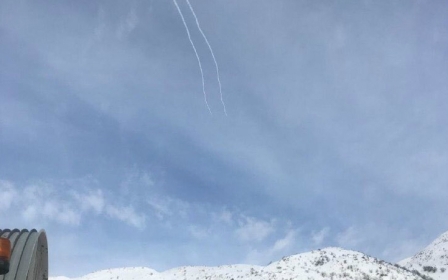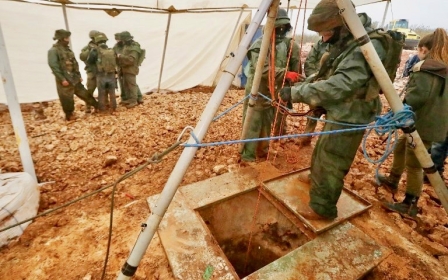Israel says it struck Iranian military targets in Syria
Israeli jets carried out raids on Iranian and Syrian military targets in Syria in the early hours of Monday, its military acknowledged, in a second successive day of attacks.
Russia, one of the Syrian government's key allies, said that the attacks on Syria's air defence batteries killed four soldiers and wounded six more.
Israel rarely comments on its operations in Syria, but in a break from the norm it said in a statement that it was "currently striking" the Iranian Quds Force in Syria and warned Syria's military against "attempting to harm Israeli territory or forces".
The military framed the raids as a response to a rocket that Israel's air defence system intercepted over the occupied Golan Heights on Sunday. Shortly before the Golan rocket incident was announced on Sunday, Syrian state media accused Israel of conducting air strikes in the country.
On Twitter, the Israeli army said it had struck targets belonging to the Iranian Revolutionary Corps Quds Force, Tehran's elite units tasked with operations abroad.
It also said that Syrian air defence systems targeted Israeli jets, and were hit in response.
"During our strike, dozens of Syrian surface-to-air missiles were launched, despite clear warnings to avoid such fire. In response, we also targeted several of the Syrian Armed Forces' aerial defense batteries," the Israeli military said.
According to the Syrian Observatory for Human Rights, a UK-based activist group monitoring the war, 11 people were killed in the strikes.
The Russian defence ministry said Syrian air defence systems had intercepted and destroyed 30 cruise missiles and guided bombs, the RIA news agency reported.
Syrian state media cited a Syrian military source as saying Israel launched an "intense attack through consecutive waves of guided missiles", but that Syrian air defences destroyed most of the "hostile targets".
Witnesses in Damascus said loud explosions rang out in the night sky for nearly an hour.
War of words
On Monday morning, Iranian airforce chief Brigadier General Aziz Nasirzadeh talked up the desire of the military to confront Israel.
"The young people in the air force are fully ready and impatient to confront the Zionist regime and eliminate it from the Earth," he was quoted as saying by the Young Journalist Club, a website supervised by state television.
The previous day, following the release of dramatic footage of Israel's air defences intercepting a rocket over a ski resort in the Golan Heights, Israeli Prime Minister Benjamin Netanyahu said his country would continue to strike Iranian targets in neighbouring Syria.
The young people in the air force are fully ready and impatient to confront the Zionist regime and eliminate it from the Earth
- Iran's Brigadier General Aziz Nasirzadeh
Israel captured the Golan Heights from Syria in 1967 and later said it had annexed the territory in a move never recognised by the international community. It has settled Israelis there in contravention with international law.
"We have a permanent policy, to strike at the Iranian entrenchment in Syria and hurt whoever tries to hurt us," Netanyahu said.
Israel has pledged to stop its main enemy Iran from entrenching itself militarily in neighbouring Syria.
It has carried out hundreds of air strikes there against what it says are Iranian military targets and advanced arms deliveries to Tehran-backed Hezbollah, the Lebanese group.
Usually silent about its attacks on Iranian targets near its frontier, Israel has lifted the veil this month, a sign of confidence in a campaign waged amid occasional tensions with Syria's big-power backer Russia.
Netanyahu and other Israeli officials have been speaking more openly about the Syria strikes in recent days, with some analysts saying the premier seems to want to further burnish his security credentials ahead of 9 April elections.
New MEE newsletter: Jerusalem Dispatch
Sign up to get the latest insights and analysis on Israel-Palestine, alongside Turkey Unpacked and other MEE newsletters
Middle East Eye delivers independent and unrivalled coverage and analysis of the Middle East, North Africa and beyond. To learn more about republishing this content and the associated fees, please fill out this form. More about MEE can be found here.




